Esther Ploeger
We Need to Measure Data Diversity in NLP -- Better and Broader
May 26, 2025Abstract:Although diversity in NLP datasets has received growing attention, the question of how to measure it remains largely underexplored. This opinion paper examines the conceptual and methodological challenges of measuring data diversity and argues that interdisciplinary perspectives are essential for developing more fine-grained and valid measures.
Multi-perspective Alignment for Increasing Naturalness in Neural Machine Translation
Dec 11, 2024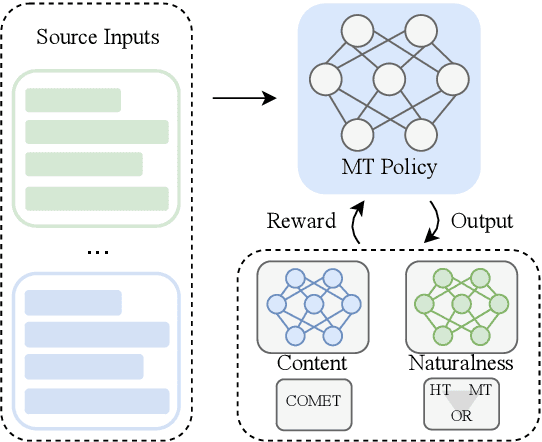
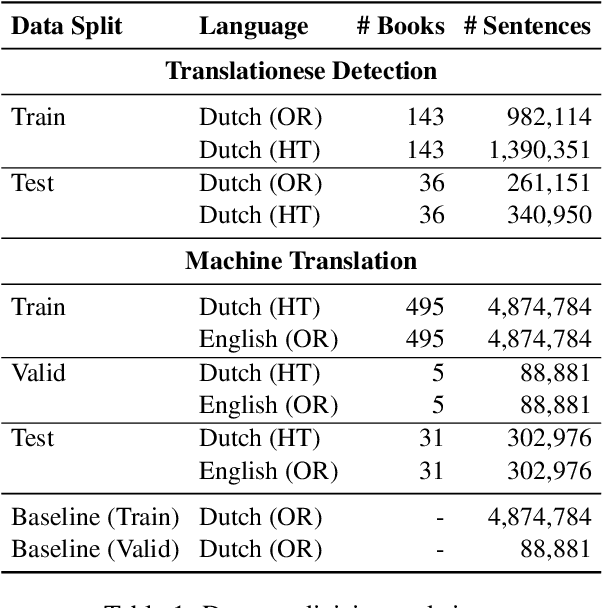


Abstract:Neural machine translation (NMT) systems amplify lexical biases present in their training data, leading to artificially impoverished language in output translations. These language-level characteristics render automatic translations different from text originally written in a language and human translations, which hinders their usefulness in for example creating evaluation datasets. Attempts to increase naturalness in NMT can fall short in terms of content preservation, where increased lexical diversity comes at the cost of translation accuracy. Inspired by the reinforcement learning from human feedback framework, we introduce a novel method that rewards both naturalness and content preservation. We experiment with multiple perspectives to produce more natural translations, aiming at reducing machine and human translationese. We evaluate our method on English-to-Dutch literary translation, and find that our best model produces translations that are lexically richer and exhibit more properties of human-written language, without loss in translation accuracy.
INCLUDE: Evaluating Multilingual Language Understanding with Regional Knowledge
Nov 29, 2024



Abstract:The performance differential of large language models (LLM) between languages hinders their effective deployment in many regions, inhibiting the potential economic and societal value of generative AI tools in many communities. However, the development of functional LLMs in many languages (\ie, multilingual LLMs) is bottlenecked by the lack of high-quality evaluation resources in languages other than English. Moreover, current practices in multilingual benchmark construction often translate English resources, ignoring the regional and cultural knowledge of the environments in which multilingual systems would be used. In this work, we construct an evaluation suite of 197,243 QA pairs from local exam sources to measure the capabilities of multilingual LLMs in a variety of regional contexts. Our novel resource, INCLUDE, is a comprehensive knowledge- and reasoning-centric benchmark across 44 written languages that evaluates multilingual LLMs for performance in the actual language environments where they would be deployed.
How Good is Your Wikipedia?
Nov 08, 2024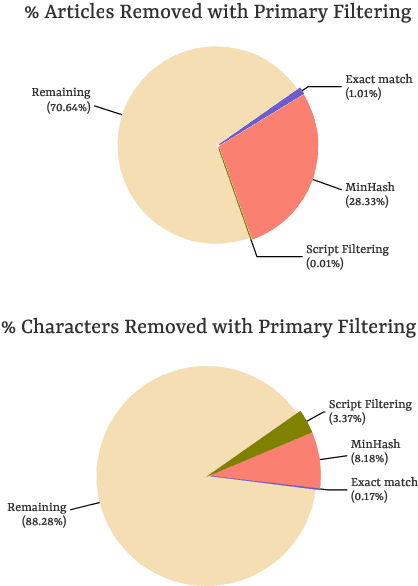
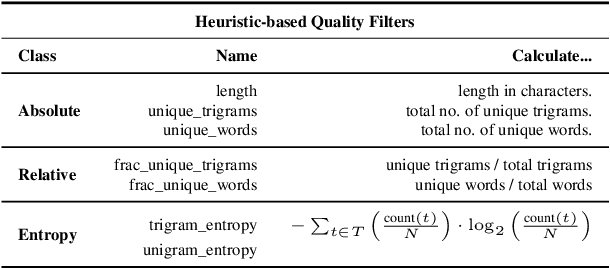
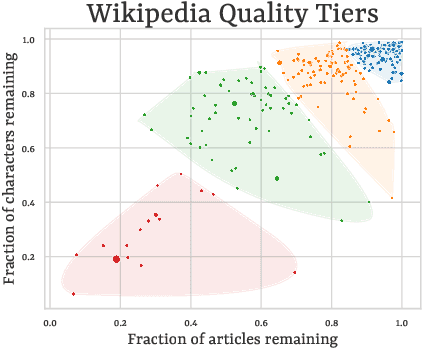
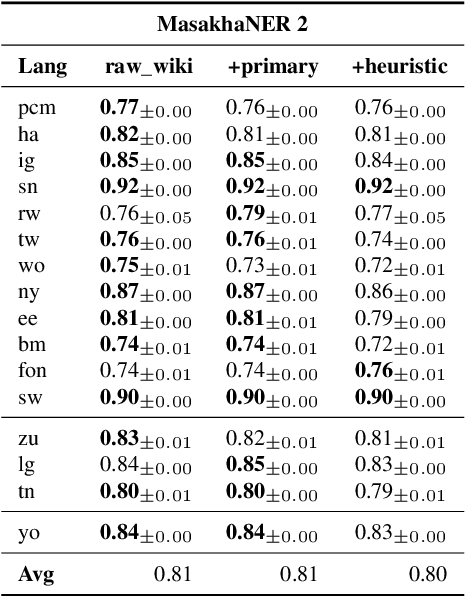
Abstract:Wikipedia's perceived high quality and broad language coverage have established it as a fundamental resource in multilingual NLP. In the context of low-resource languages, however, these quality assumptions are increasingly being scrutinised. This paper critically examines the data quality of Wikipedia in a non-English setting by subjecting it to various quality filtering techniques, revealing widespread issues such as a high percentage of one-line articles and duplicate articles. We evaluate the downstream impact of quality filtering on Wikipedia and find that data quality pruning is an effective means for resource-efficient training without hurting performance, especially for low-resource languages. Moreover, we advocate for a shift in perspective from seeking a general definition of data quality towards a more language- and task-specific one. Ultimately, we aim for this study to serve as a guide to using Wikipedia for pretraining in a multilingual setting.
Towards Tailored Recovery of Lexical Diversity in Literary Machine Translation
Aug 30, 2024Abstract:Machine translations are found to be lexically poorer than human translations. The loss of lexical diversity through MT poses an issue in the automatic translation of literature, where it matters not only what is written, but also how it is written. Current methods for increasing lexical diversity in MT are rigid. Yet, as we demonstrate, the degree of lexical diversity can vary considerably across different novels. Thus, rather than aiming for the rigid increase of lexical diversity, we reframe the task as recovering what is lost in the machine translation process. We propose a novel approach that consists of reranking translation candidates with a classifier that distinguishes between original and translated text. We evaluate our approach on 31 English-to-Dutch book translations, and find that, for certain books, our approach retrieves lexical diversity scores that are close to human translation.
A Principled Framework for Evaluating on Typologically Diverse Languages
Jul 06, 2024Abstract:Beyond individual languages, multilingual natural language processing (NLP) research increasingly aims to develop models that perform well across languages generally. However, evaluating these systems on all the world's languages is practically infeasible. To attain generalizability, representative language sampling is essential. Previous work argues that generalizable multilingual evaluation sets should contain languages with diverse typological properties. However, 'typologically diverse' language samples have been found to vary considerably in this regard, and popular sampling methods are flawed and inconsistent. We present a language sampling framework for selecting highly typologically diverse languages given a sampling frame, informed by language typology. We compare sampling methods with a range of metrics and find that our systematic methods consistently retrieve more typologically diverse language selections than previous methods in NLP. Moreover, we provide evidence that this affects generalizability in multilingual model evaluation, emphasizing the importance of diverse language sampling in NLP evaluation.
What is 'Typological Diversity' in NLP?
Feb 14, 2024



Abstract:The NLP research community has devoted increased attention to languages beyond English, resulting in considerable improvements for multilingual NLP. However, these improvements only apply to a small subset of the world's languages. Aiming to extend this, an increasing number of papers aspires to enhance generalizable multilingual performance across languages. To this end, linguistic typology is commonly used to motivate language selection, on the basis that a broad typological sample ought to imply generalization across a broad range of languages. These selections are often described as being 'typologically diverse'. In this work, we systematically investigate NLP research that includes claims regarding 'typological diversity'. We find there are no set definitions or criteria for such claims. We introduce metrics to approximate the diversity of language selection along several axes and find that the results vary considerably across papers. Crucially, we show that skewed language selection can lead to overestimated multilingual performance. We recommend future work to include an operationalization of 'typological diversity' that empirically justifies the diversity of language samples.
Multilingual Gradient Word-Order Typology from Universal Dependencies
Feb 02, 2024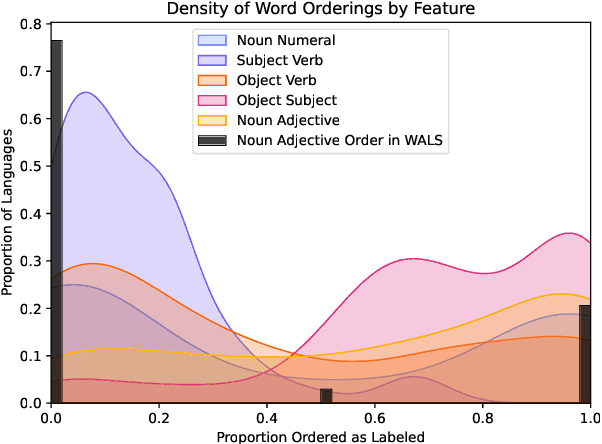

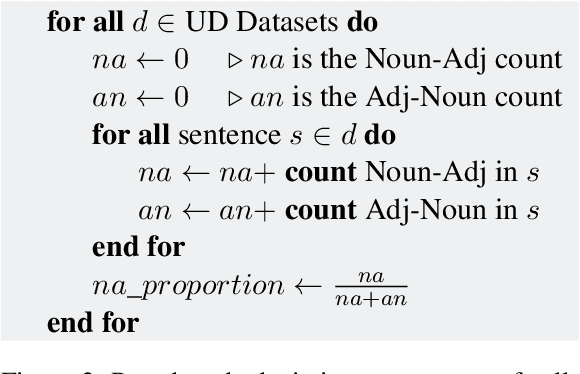

Abstract:While information from the field of linguistic typology has the potential to improve performance on NLP tasks, reliable typological data is a prerequisite. Existing typological databases, including WALS and Grambank, suffer from inconsistencies primarily caused by their categorical format. Furthermore, typological categorisations by definition differ significantly from the continuous nature of phenomena, as found in natural language corpora. In this paper, we introduce a new seed dataset made up of continuous-valued data, rather than categorical data, that can better reflect the variability of language. While this initial dataset focuses on word-order typology, we also present the methodology used to create the dataset, which can be easily adapted to generate data for a broader set of features and languages.
CreoleVal: Multilingual Multitask Benchmarks for Creoles
Oct 30, 2023Abstract:Creoles represent an under-explored and marginalized group of languages, with few available resources for NLP research. While the genealogical ties between Creoles and other highly-resourced languages imply a significant potential for transfer learning, this potential is hampered due to this lack of annotated data. In this work we present CreoleVal, a collection of benchmark datasets spanning 8 different NLP tasks, covering up to 28 Creole languages; it is an aggregate of brand new development datasets for machine comprehension, relation classification, and machine translation for Creoles, in addition to a practical gateway to a handful of preexisting benchmarks. For each benchmark, we conduct baseline experiments in a zero-shot setting in order to further ascertain the capabilities and limitations of transfer learning for Creoles. Ultimately, the goal of CreoleVal is to empower research on Creoles in NLP and computational linguistics. We hope this resource will contribute to technological inclusion for Creole language users around the globe.
The Past, Present, and Future of Typological Databases in NLP
Oct 20, 2023Abstract:Typological information has the potential to be beneficial in the development of NLP models, particularly for low-resource languages. Unfortunately, current large-scale typological databases, notably WALS and Grambank, are inconsistent both with each other and with other sources of typological information, such as linguistic grammars. Some of these inconsistencies stem from coding errors or linguistic variation, but many of the disagreements are due to the discrete categorical nature of these databases. We shed light on this issue by systematically exploring disagreements across typological databases and resources, and their uses in NLP, covering the past and present. We next investigate the future of such work, offering an argument that a continuous view of typological features is clearly beneficial, echoing recommendations from linguistics. We propose that such a view of typology has significant potential in the future, including in language modeling in low-resource scenarios.
 Add to Chrome
Add to Chrome Add to Firefox
Add to Firefox Add to Edge
Add to Edge